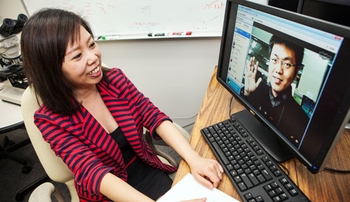It would take 6,000 complete sets of the seven-book Harry Potter series to hold the data researcher John Chan, M.D., has generated from 22 lymphoma biopsies.
All this data comes from patients who had a form of non-Hodgkin lymphoma (NHL) called follicular lymphoma and subsequently developed a more aggressive tumor called transformed follicular lymphoma.
 |
Graduate students Weiwei Zhang and Qiang Gong collaborate from half a world away on cancer research. |
“About 40 percent of the patients experience transformation and once that happens, the prognosis gets much worse,” said Dr. Chan, the Amelia and Austin Vickery Professor of Pathology, who has studied NHL for more than 20 years. “We want to discover the genetic abnormalities associated with the transformation and find molecular targets for treatment.”
An accident of nature
In follicular lymphoma, the bcl2 (B-cell lymphoma 2) gene that regulates cell death is moved to a new place on the DNA where its normal function is altered. It is believed to be involved in resistance to conventional cancer treatment.
“Everyone has two sets of chromosomes,” he said. “It’s an accident of nature to get the first translocation of the bcl2 gene. This molecular change then allows subsequent additional genetic changes responsible for the development of the lymphoma.”
Help sorting it all out
Although UNMC’s Next Generation Sequencing core laboratory enabled Dr. Chan to generate enormous amounts of sequencing data quickly, he needed greater capacity and assistance to analyze it all.
He turned to China where there are five large capacity gene sequencing facilities, one of which is the Beijing Institute of Genomics (BIG) of the Chinese Academy of Sciences.
Qiang Gong, a BIG graduate student and a bioinformatics expert, was paired with Weiwei Zhang, a second-year bioinformatics graduate student in Dr. Chan’s lab. They worked for a while via email, but the distance and time differences hampered effective communication.
Foundation support
Dr. Chan used a University of Nebraska Foundation grant that was set aside for global initiatives to bring Gong to Omaha for three months last summer.
By September, Gong had worked with Zhang to establish a new, efficient algorithm to analyze data from Exome sequencing of the follicular lymphoma and the transformed samples.
Dr. Chan expects to complete the analysis soon, after which they will publish results and Gong will be honored as a co-author.